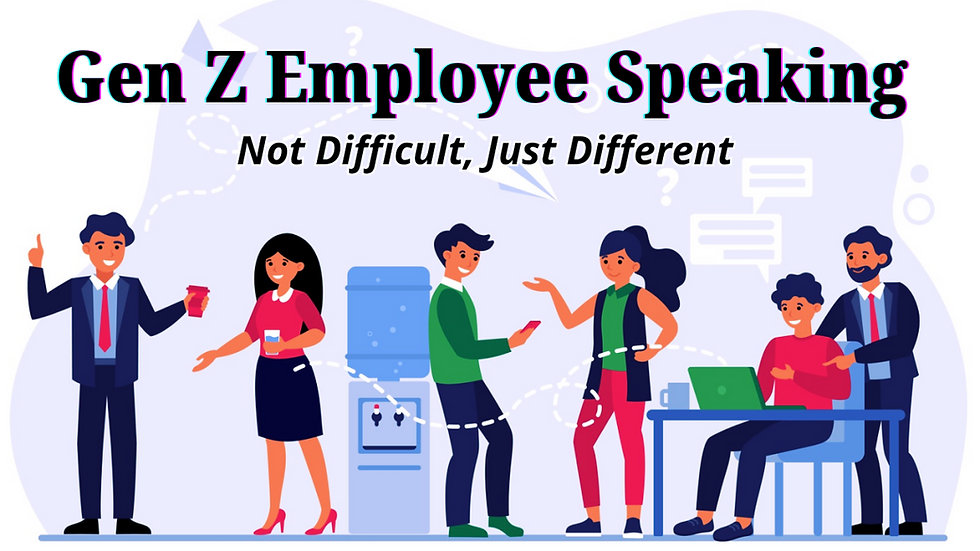In the past decade, increasing employee productivity has become the heartbeat of today’s workplaces. In India, where competition is fierce, keeping your team engaged isn’t just a perk—it’s essential f
- Vinita Sulakhe

- Jul 3, 2025
- 4 min read

We’ve all heard the TED Talks, HR workshops and read LinkedIn posts about “How to manage Gen Z in the workplace.”
Some even go as far as “tolerating” us. Imagine that.
But let’s flip the perspective, shall we?
I’m a Gen Z employee. Yes, one of those “Instagram-scrolling, boundary-setting, coffee-fuelled” creatures. Walked into the corporate world straight out of my final exam, high on ambition, dreams and just a touch of impostor syndrome.
Spoiler alert: nothing prepares you for what's really out there.
No guidebook. No ‘Welcome to Adulthood’ starter pack. Just you, a laptop and a whole lot of what-is-happening.
I still remember my first day at the office… home office (thanks, lockdown). The laptop was new, the air was cold and I was sweating buckets. My manager said “take initiative” about 37 times on our first call. I nodded like I got it… and then Googled it.
But even so, everything felt so distant and out of reach. The team was scattered across different cities and the only forms of communication were messages and ‘am-I-audible?’ virtual team meetings.
When hybrid work finally became a thing, I had mixed feelings.
The thrill and excitement of going to an actual office, having my own desk and finally meeting my team was enough motivation to be fully onboard with the idea, but soon enough, the novelty wore off.
The bright light, centralised AC, the buzz of the office, figuring out the coffee machine was an adrenaline rush; however, very quickly, I noticed the vibe.
I was “that Gen Z.”
The one who asked why before how. The one who didn’t feel bad for logging off at 6:00 PM because work-life balance is a choice, not a suggestion.
The one who just… thought differently.
We are a whole different generation, but we are still people. We have our values and principles; they might not match the old playbook, but they matter to us and to where the world’s headed.
On that note, let me address some of the buzzwords we’re constantly associated with. We hear them all the time, but let’s unpack what they mean:
Lazy – We’re not lazy, we just question the system. If we have better and effective ways to do things in less time and go about our lives, then why not use them?
Addicted to Phones/ Always Online – Sure, we’re on our phones a lot. But we’re not just scrolling for the sake of it; we’re networking, building brands, learning new skills and keeping up with a fast-moving world. Being connected 24/7 means we’re more informed, more engaged and more adaptable than ever. We grew up in a world that’s constantly changing, so our devices are tools, not distractions
No Work Ethic – We just approach work differently. We value efficiency, flexibility and rest just as much as productivity. We do work hard, but we also want balance. We’re rethinking what healthy, sustainable success looks like
Overly Idealistic – We believe in change because we’ve seen how quickly things can shift socially, economically, environmentally… and personally. We’re not naive for wanting better. We’re hopeful and ready to put in the work
Too Sensitive – Imagine growing up and adulting during climate crises, economic instability, a pandemic, home drama, societal pressure, parental expectations and still showing up to work overcoming the daily traffic torture. That’s not weakness. That’s strength and resilience
Can’t Take Criticism – We’re open to growth, but we also believe in mutual respect. Constructive feedback is great, but outdated mindsets and rigid hierarchies wrapped into feedback? Not so much. We value collaboration and clarity over top-down lectures
Here’s the thing: we are not trying to burn it all down; we want to build something better. We’re not here to play by the old rules if those rules no longer serve anyone.
Yes, we want remote work. No, not because we want to nap between meetings, but because we’ve seen that life’s too fragile to waste commuting 3 hours a day to write emails we could send from our living room.
Yes, we care deeply about mental health. Because we’ve seen what happens when it’s ignored.
We don’t see jobs as identities. We see them as partnerships. If we don’t feel aligned, we don’t stick around, not out of disloyalty, but out of self-respect.
Calling us “difficult to manage” misses the bigger question: Why weren’t the systems built to include flexibility, empathy, innovation and an open culture in the first place?
So, what do we want?
Honestly? We want a world that listens.
We want a workplace that understands that productivity and well-being are not at odds; they’re co-workers.
We want leaders who coach, not command. We want honesty, not just corporate-speak. We want the freedom to show up as our full selves- tattoos, coloured hair, anxiety, neurodivergence and all and not be asked to shrink to fit a mould.
Despite all this, we’re not pessimistic. We’re just… realistic optimists. We know the system is flawed, but we also believe we can fix it or at least meme about it until someone does.
We joke and laugh to cope, sarcasm is our defence mechanism, we truly do believe animals are better and we care deeply. We speak up because silence never saved anyone.
And one day, we’ll be the managers, we’ll be the ones running the show.
Maybe then, the world will look a little different. A little softer. A little more human.
But until then, catch us quietly dismantling the entrenched systems one emoji at a time.




Comments